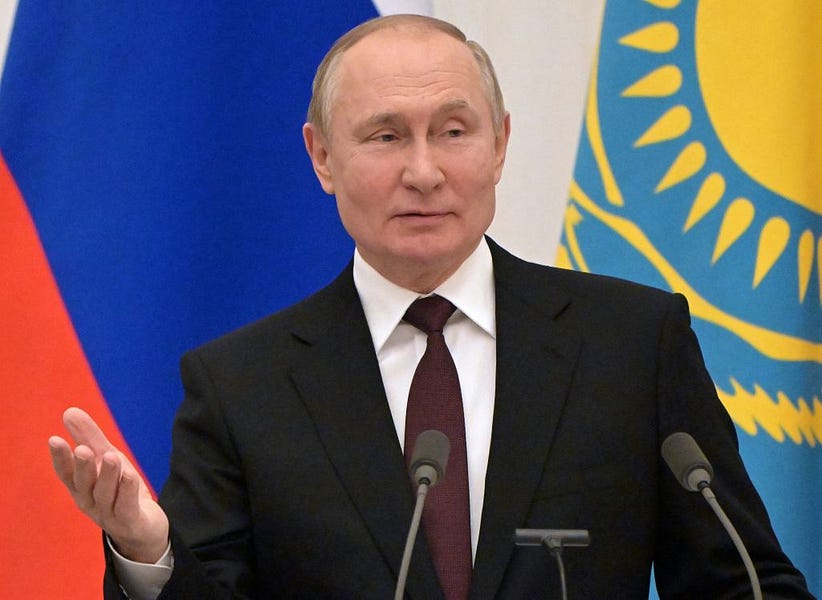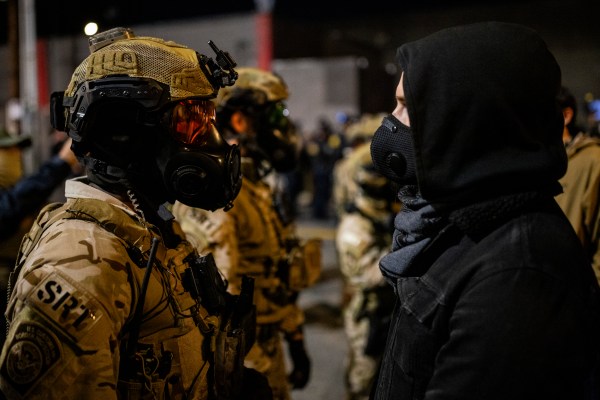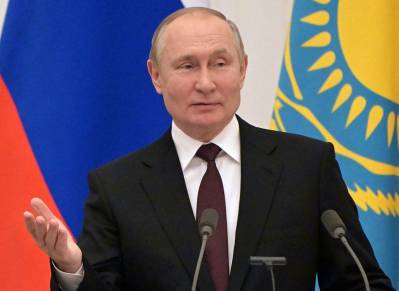Vladimir Putin has deliberately created and escalated a crisis in Europe. He has managed to get meetings or calls with Western leaders dozens of times since he started turning up the heat on Ukraine last spring. The alleged main “reason” for this crisis is that Ukraine is a threat to Russia, as it will one day join NATO and become another NATO base. Some Russian propagandists and their toadies in the West constantly repeat the idea that this crisis is all about NATO expansion, and that it could all go away if the United States pledged that Ukraine would never be part of the alliance. But the propaganda that Russia directs to its own people makes a much different argument. Case in point: During all this time and with all these visits, Putin has never met or attempted to meet with Ukrainian President Volodymyr Zelensky. When a journalist asked Putin last summer why he hadn’t done so, Putin replied: “Why [should I] meet with Zelensky if he has put his country under complete external control? The key issues of Ukraine’s life are resolved not in Kyiv, but in Washington, and partly in Berlin and Paris.”
This is a clear look at a propaganda talking point that some Russians and pro-Russian Ukrainians have been reiterating for years, a talking point that is much less visible in their Western-facing propaganda. This phrase “external control” (внешний контроль) or sometimes “external management” (внешнего управления) is at the heart of Putin’s professed grievances when he speaks to Russians. But what does it mean?
The essence of this idea is that Ukraine is not really a democracy or a sovereign country. It is a fake, potemkin democracy that is actually run by some kind of deep state controlled by foreign powers. The most common culprits for the “secret rulers” of Ukraine are the International Monetary Fund, the U.S. State Department, the CIA, and—of course—George Soros. According to this idea, Ukraine’s 2014 revolution was not a pro-democracy, anti-corruption popular revolt but an orchestrated coup that put Ukraine under the secret occupation of anti-Russian Western manipulators.
Putin decided to elaborate his views in a July 2021 essay “On the Historical Unity of Russians and Ukrainians.” He described a Westernizing Ukraine as an “anti-Russia Project” “under the protection and control of the Western powers.” He was explicit that “we are witnessing not just complete dependence but direct external control, including the supervision of the Ukrainian authorities, security services and armed forces by foreign advisers, military ‘development’ of the territory of Ukraine and deployment of NATO infrastructure.” Putin is not being innovative here. Here is an example from 2020 of this kind of argument that appeared on several pro-Russian “news” websites that describes how the IMF and George Soros took Ukraine away from the pro-Russian Ukrainian President Viktor Yanukovych:
“Under the ‘dictator’ Yanukovych, cooperation with the IMF was suspended, which is still presented as one of the terrible crimes of the ‘totalitarian regime.’ The IMF’s demands were surprisingly diverse, from fighting for LGBT minority rights and respecting intellectual property rights to raising utility tariffs and privatizing land... ‘Sorosyata’ [Soros’ people] penetrate into all government spheres, and also create a pro-Western simulacrum of a ‘civil-society’ of anti-corruption activists, media workers, volunteers, the ‘creative class’ and ‘ATO veterans’ [Ukrainian war veterans]. Loans from the IMF begin to be considered a ‘natural’ method of introducing the values of global, world civilization...”
(The “sorosyata” word there is an insult in some circles. It is a Russian pun that sounds a lot like the Russian word porosyata, “son-of-a-pig”.)
Where did this idea come from? “External control” is a convenient placeholder or catch-all term for any number of bogeymen, which can be suited to taste. In addition to the usual CIA/Soros/IMF suspects, one could also include the EU, MI6, or Mossad. By saying “external control” a propagandist can accuse Ukraine of being a fake country without alienating die-hard paranoids who have a specific culprit in mind.
The phrase also helps support moral equivalence between Ukraine’s Western friends, and Russia and its pro-Russian Ukrainian allies. If Ukraine is under “external control,” then the fight is not between a free people and a kleptocratic empire, but between two different powers fighting over a prize. The oligarchic power of the pro-Western interests might have better camouflage than the oligarchic powers of the pro-Russian interests, but really this is just a battle over spheres of interest. At least Russia is culturally close to Ukraine, not an alien globalist force like the West.
We should not discount the potential for self-righteousness here. There is a deeper history to this “external control” idea that goes back to Soviet times at least. According to Lenin’s theory of Imperialism, there are no free countries in the so-called “democratic” world. Small countries are especially likely to be secretly controlled by powerful foreign interests, and Soviet propaganda was full of accusations of the clandestine influence of the IMF, the EEC, NATO, CIA, etc. Of course, there were fake democracies in the Western camp, and there were clandestine operations by the CIA and other Western intelligence agencies, but Soviet ideology did not portray these as special cases, they were the norm and if you cannot detect it, that just means it is well-hidden. There were no real representative governments, none. All republics were “democracies for the money-bags” as Lenin put it in The State and Revolution. The smaller states were under the control of the bigger ones, who were in turn under the control of a small oligarchy of “finance capital” that manipulated politics and culture. The colonialism of the past had been replaced by a neocolonialism of secret control.
After 70 years of Soviet indoctrination, some people have maintained this beliefeven after the collapse of the USSR. Putin and his advisers might be among them. One can catch an early whiff of this idea in some comments Putin made in Turkey in 2004. When commenting on the Ukrainian Orange Revolution of 2004 (a harbinger of the 2014 Maidan Revolution) Putin complained that he was worried about a future with Europe divided into two zones - into colonizer and colonized. In 2004 Putin indicated he feared that Ukrainians objecting to a fixed election were part of some neocolonial scheme, and he compared NATO’s efforts to end a genocide in the former Yugoslavia to a colonial master punishing an upstart native.
A few years later Putin’s adviser Vladislav Surkov wrote an essay inaugurating the standard slogan of Putin’s rule: “sovereign democracy.” The purpose of the Russian state, he wrote, was to maintain the “real sovereignty” of Russia as the pinnacle of a true democracy, in contrast to other states which just “periodically change patrons.” In these countries (Ukraine being the obvious example) the “creation of fake ‘revolutions’ and externally-controlled democracies, apparently artificial, is actually quite natural.”
This is how Russian-language propaganda has approached Ukraine since 2014. Given the backgrounds of Russia’s leaders in the Soviet upper-crust and security forces, they may actually believe this Leninist myth.
If this sort of sounds to you like the “deep state” myth that is increasingly popular among certain elements of the right in the U.S. (as it is still on the far-left), Russian ideologues agree. In a 2019 essay (helpfully translated by Memri) the same Kremlin adviser Vladislav Surkov who coined “sovereign democracy” hailed the use of the term “deep state” to describe Western democracies. This deep state is an “absolutely undemocratic network organization of the real power of security services hidden behind the external window-dressing of democratic institutions.” It is a “mechanism that effectively acts through violence, bribery and manipulation and remained hidden deep beneath the surface of civil society; … [it] simultaneously verbally condemns (hypocritically or innocently) manipulation, bribery and violence.”
If it is true that Western democracies are actually under the control of their corrupt security forces, then would it not be good to destroy these clandestine tyrannies? Surkov agrees, and he presents Russian interference in democratic elections as part of a righteous liberation struggle: “Foreign politicians blame Russia for interference in elections and referendums around the globe. But in fact, the matter is even more serious—Russia interferes in their brains, and they do not know what to do with their own altered consciousness.”
Let this Surkov essay serve as a warning. Putin’s continuing assaults on the nascent Ukrainian democracy are part and parcel of a general assault on democracy worldwide, including in the United States. If Putin tries to set up a new or rival government in Ukraine, he will declare he is freeing the country from secret Western control. And when he attacks other free countries and even American democracy again he will praise himself as a liberator.






Please note that we at The Dispatch hold ourselves, our work, and our commenters to a higher standard than other places on the internet. We welcome comments that foster genuine debate or discussion—including comments critical of us or our work—but responses that include ad hominem attacks on fellow Dispatch members or are intended to stoke fear and anger may be moderated.
With your membership, you only have the ability to comment on The Morning Dispatch articles. Consider upgrading to join the conversation everywhere.